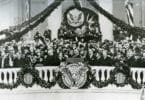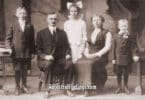Continuing our Pillars of Power series, exploring the lives and legacies of America’s presidents, we turn to Dwight D. Eisenhower, a leader whose military background, steady leadership, and moderate policies shaped America during a time of prosperity and tension. Known for his role in World War II and as a symbol of 1950s stability, Eisenhower’s presidency brought significant achievements and faced complex challenges that left a lasting impact on the nation. Let’s learn about Eisenhower’s family history, rise to prominence, strengths and limitations as president, and enduring legacy.
Family Background: The Eisenhower Lineage
Dwight David Eisenhower was born on October 14, 1890, in Denison, Texas, though he was raised in Abilene, Kansas. His family, of German-Swiss descent, traced their roots to Johann Nicolaus Eisenhauer, who emigrated from Germany to Pennsylvania in the 18th century. Eisenhower’s grandfather, Jacob Eisenhower, settled in Kansas after the Civil War, marking the family’s establishment in the American heartland.
Eisenhower’s parents, David Jacob Eisenhower and Ida Elizabeth Stover were deeply religious and valued education and hard work. The Eisenhower family lived modestly, and Dwight, known as “Ike” from a young age, was one of seven brothers. His upbringing in a tight-knit, hardworking household instilled values of resilience, humility, and discipline, which he would carry into his military and political careers.
Military Career and Family Life
In 1911, Eisenhower entered the United States Military Academy at West Point, where he demonstrated leadership qualities that would propel his future success. After graduating, he married Mamie Geneva Doud in 1916. The couple shared a deep bond, and Mamie became a prominent first lady known for her charm and hospitality. Together, they had two sons, Doud Dwight, who tragically died of scarlet fever at age three, and John Sheldon Doud Eisenhower, who followed in his father’s footsteps and became a military officer, historian, and diplomat.
His strategic mind and unshakable resolve distinguished Eisenhower’s military career. During World War II, he rose to global prominence as Supreme Commander of the Allied Expeditionary Force in Europe, where he led the successful D-Day invasion in 1944. His reputation as a leader grew, and upon returning home, he became one of America’s most celebrated military figures, eventually leading to his successful presidential campaign.
The Eisenhower Presidency: Strengths and Limitations
From 1953 to 1961, Eisenhower’s presidency was marked by steady, moderate governance. Here’s a look at the strengths and limitations of his leadership:
Strengths of Eisenhower’s Presidency
• Interstate Highway System: One of Eisenhower’s most enduring legacies was the creation of the Interstate Highway System, inspired by the efficient road networks he’d seen in Germany. This system transformed American infrastructure, enabling faster travel, boosting commerce, and connecting communities nationwide.
• Economic Prosperity: The 1950s saw remarkable economic growth, and Eisenhower’s fiscal conservatism helped maintain stability. He balanced the federal budget three times, reduced federal deficits, and supported a moderate approach that encouraged both economic expansion and controlled spending.
• Foreign Policy and the Cold War: Eisenhower’s approach to foreign policy was cautious and strategic. He favored containment of communism rather than direct conflict, aiming to keep America strong without overextending military resources. His “Eisenhower Doctrine” sought to contain Soviet influence in the Middle East, and his emphasis on diplomacy helped avoid escalation with the USSR, especially during tense moments like the Suez Crisis and the U-2 incident.
• Civil Rights Support: Although hesitant to intervene in social issues, Eisenhower took decisive action during the Little Rock Crisis in 1957, sending federal troops to enforce school desegregation. His signing of the Civil Rights Act of 1957, the first civil rights legislation since Reconstruction, marked a step forward for civil rights, albeit with limited immediate impact.
Limitations of Eisenhower’s Presidency
• Limited Action on Civil Rights: Despite his involvement in Little Rock, Eisenhower’s civil rights efforts were often seen as reluctant and conservative. Critics argue that he could have supported the burgeoning civil rights movement more, as his administration’s incremental steps failed to fully address activists’ demands.
• Reliance on Covert Operations: Eisenhower’s administration frequently relied on covert CIA operations to influence foreign affairs, including interventions in Iran and Guatemala. These controversial actions often destabilized other nations, leading to long-term consequences that critics argue reflected poorly on American foreign policy.
• Environmental and Health Neglect: Eisenhower’s administration showed limited concern for environmental and public health issues, particularly in the face of growing concerns about nuclear fallout from atomic testing. Environmental historians have criticized his lack of response as a missed opportunity to address emerging public health and environmental concerns.
Life After the Presidency and Family Legacy
After leaving office in 1961, Eisenhower retired to his farm in Gettysburg, Pennsylvania, where he enjoyed a quieter life with Mamie. He wrote his memoirs and remained engaged in public life, offering advice to successors and reflecting on his years in service. Eisenhower passed away on March 28, 1969, leaving behind a legacy of stability, strength, and pragmatism.
Eisenhower’s descendants have continued to contribute to public service and history. His son John served as a military officer, ambassador, and historian, authoring several works on military history. The Eisenhower family remains a respected name in American history, symbolizing values of duty, honor, and patriotism.
Legacy: Strengths and Limitations in Perspective
Dwight D. Eisenhower’s presidency is often remembered as a period of calm leadership during an era of prosperity and tension. His moderate, cautious approach helped guide the nation through the complexities of the Cold War without escalating conflicts. The Interstate Highway System remains a testament to his vision for American infrastructure, and his measured foreign policy approach helped avoid costly wars.
However, his limited engagement in the civil rights movement, reliance on covert actions, and lack of attention to emerging public health concerns reflect the limitations of his presidency. Despite these criticisms, Eisenhower’s legacy endures as a leader who embodied the values of his generation, advocating for stability and unity in a rapidly changing world.
To gain a comprehensive understanding of Dwight D. Eisenhower’s life and presidency, consider the following biographies:
Authored by Jean Edward Smith, this biography offers an in-depth exploration of Eisenhower’s military and political careers, providing a balanced perspective on his leadership and legacy.
Eisenhower: Soldier and President
Stephen E. Ambrose presents a detailed account of Eisenhower’s journey from a five-star general to the 34th President of the United States, highlighting his strategic decisions and personal attributes.
The Age of Eisenhower: America and the World in the 1950s
William I. Hitchcock examines Eisenhower’s presidency within the context of the 1950s, analyzing his influence on both domestic policies and international affairs during a transformative era.
Paul Johnson provides a concise yet insightful biography, focusing on Eisenhower’s leadership qualities and the pivotal moments that defined his career.
Carlo D’Este delves into Eisenhower’s military career, offering a comprehensive analysis of his strategies and contributions during World War II, shedding light on his leadership development. These biographies provide diverse perspectives on Eisenhower’s life, leadership, and enduring impact on American history.






